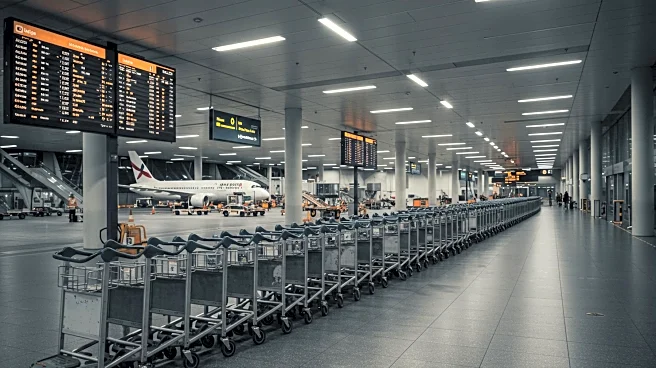What is the story about?
What's Happening?
Air Canada has suspended its operations following a strike by over 10,000 flight attendants, leaving travelers stranded during the peak summer travel season. The strike commenced after the Canadian Union of Public Employees rejected the airline's proposal for government-directed arbitration, which would have prevented the strike and allowed a third-party mediator to set contract terms. The strike began at 1 a.m. EDT on Saturday, with Air Canada subsequently locking flight attendants out of airports. Federal Jobs Minister Patty Hajdu has urged both parties to reach a resolution, emphasizing the importance of progress for Canadian travelers. The strike impacts approximately 130,000 passengers daily, with about 25,000 Canadians potentially stranded abroad each day. Air Canada operates around 700 flights daily, and the shutdown could last up to a week before operations resume.
Why It's Important?
The strike has significant implications for Canada's transportation sector and economy, as Air Canada is a major player in national and international travel. The disruption affects not only passengers but also cargo transport services, which are crucial for supply chains. The Business Council of Canada has called for binding arbitration to mitigate the economic impact. The strike highlights ongoing labor disputes in the airline industry, particularly concerning wages and working conditions. The union argues that the proposed wage increases do not adequately address inflation and the unpaid work flight attendants perform. The situation underscores the broader challenges faced by airlines in balancing labor relations with operational demands.
What's Next?
Air Canada has announced that passengers affected by the strike can request full refunds or alternative travel options through other airlines, though rebooking may be difficult due to high demand during the summer travel peak. The airline's Chief Operating Officer, Mark Nasr, indicated that restarting operations could take up to a week once a tentative agreement is reached. The federal government may consider imposing binding arbitration, as it did with the country's major railroads last year. The ongoing negotiations between Air Canada and the union will be crucial in determining the duration of the strike and its impact on travelers.
Beyond the Headlines
The strike raises broader questions about labor rights and the role of government intervention in labor disputes. The union's stance on wages reflects wider concerns about the cost of living and fair compensation in the airline industry. The situation may prompt discussions on the sustainability of current labor practices and the need for reforms to ensure equitable treatment of workers. Additionally, the strike could influence future negotiations in other sectors, setting precedents for how labor disputes are handled in Canada.















